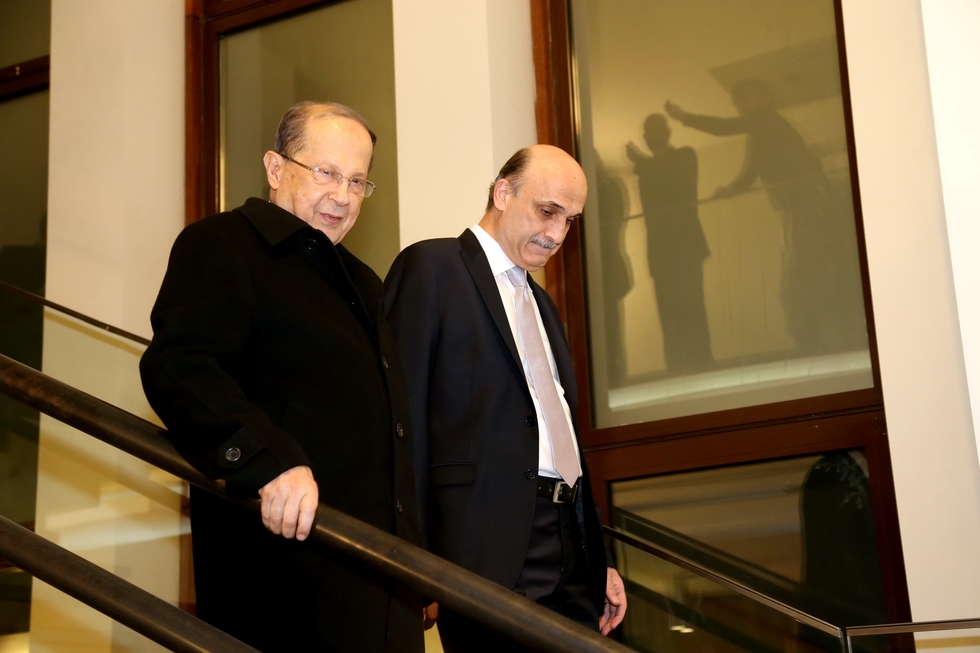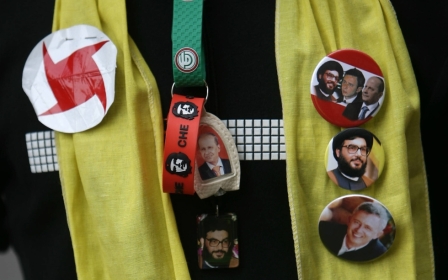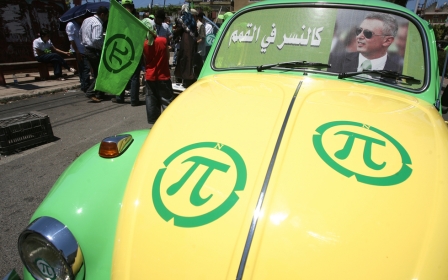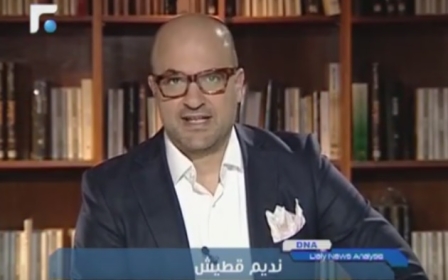Michel Aoun and the death of Lebanon's Taef accord

The Lebanese have a saying which roughly translates into the following “if you get to live long enough you will see many strange things”.
This was true of what many witnessed this week when the head of the Lebanese Forces (LF) Samir Geagea, himself a contender for the presidency, announced his full support of his arch nemesis General Michel Aoun.
What might appear to some as a primordial feud dates back merely to the end of the civil war in 1990. Aoun as the head of the Lebanese Armed Forces and interim prime minister decided to wage a full-scale war against the LF militia at the time. The War of Elimination witnessed some of the fieriest Christian infighting which to many was a watershed moment leading to the eventual weakening and decline of the Lebanese Christians.
This strange, yet expected, nomination came as a response to Geagea allies’ recent nomination of Suleiman Frangieh, one of the four main contenders for the presidency, now vacant for 20 months.
While this might be perceived as a mere manoeuvre on the part of Samir Geagea which includes short and long-term gains for him and his faction, the ramifications of this move are more problematic than they may appear.
After Geagea’s release from prison in 2005 and Aoun’s return from his Parisian exile, both these men diverged on their position vis-a-vis the Syrian regime and Hezbollah weapons. Aoun, initially an ardent opponent of both, would soon reposition and sign the Faustian MOU with Hezbollah, giving the latter the much needed Christian support they lacked especially after their 2006 war with Israel.
Another somewhat existential difference between the LF and the Free Patriotic Movement (FPM) is their stance on the 1989 Taef Accord and the new governance structure it introduced.
While the Lebanese Forces endorsed the constitutional amendments and the new power-sharing formula while rejecting the Syrian tutelage that came along with it, Aoun and coincidently Hezbollah never embraced Taef nor respected the post-war redistribution of power that curbed the powers of the office of the Maronite president.
This however did not prevent both these leaders from trying to hammer out their differences in order to elect a president. In June 2015, they signed a declaration of intent which included an elaborate list of topics to be addressed by the two sides. However, this remained merely a mental exercise which was never taken seriously by the other Lebanese factions, until today.
Taef under threat
The imperial and somewhat theatrical manner in which Geagea announced Aoun’s candidacy did not mask an essential fact which is that the former was breaking with the Taef consensus and adopting the strong president rhetoric his new ally Aoun popularly flaunts. Geagea's U-turn has virtually shattered two main concepts.
The first obvious one is the long-ailing March 14 movement which has failed time and again to respond to the challenges of the March 8 coalition and its Iranian/Syrian patrons. By naming Aoun, Geagea has sent a clear message that a consensus president in line with the Taef accord is no longer an option, but rather a strong confrontational leader who can reclaim the lost rights of the Christians.
This challenge to the Sunni political establishment and the rest of the Muslims could reflect badly on the Christians at least in the long term. By revoking the Taef, which gave the Christians disproportionate representation despite less favourable demographic realities, it removes a safety net for Christians in years to come.
Saad al-Hariri has resisted for years calls for a rebalancing to this formula and the adoption of a 1/3 quota that gives the Shiites constitutionally an equal share of the government. Hariri at least morally has no obligation to honour his alliance with Geagea, who has left the realm of Saudi political influence and decided to adopt Hezbollah’s main political ally.
However, what does this translate to in practical terms? Naming Aoun as president and electing him are two different matters. As it stands, Aoun and Frangieh are set for a showdown, provided that both sides agree to go to the parliament to cast their votes.
Moreover, the Lebanese Forces voting for Aoun won’t be sufficient even with the main Hezbollah bloc to secure his win. Suleiman Frangieh, if he continues to refuse to withdraw in favour of Aoun, should be able to secure enough votes, if not in the first round perhaps in the second, from the anti-Aoun front.
This front possibly will include the bloc behind speaker Nabih Berri, who harbours no real personal nor political sentiment for Aoun, a fact which the latter seems to realise perfectly well. While Frangieh is burdened by his friendship with Bashar al-Assad and his unsophisticated character, Aoun’s aggressive and condescending attitude and his full Iranian backing makes him less likely to win this race.
The anti-Aoun bloc seems to prefer a pro-Syrian president who can keep the last traces of the Taef to an ageing but supposedly strong president who threatens it.
Geagea on the other hand wants to assume the role of the new kingmaker, something permissible and legitimate politically and personally, yet no one ought not to forget that meddling in the Taef might bring about a new king. At this stage, ensuring that this kingdom or Lebanon as we know it persists is something no sane person can promise.
-Makram Rabah is a PhD candidate at Georgetown University’s history department. He is the author of A Campus at War: Student Politics at the American University of Beirut, 1967–1975 and a regular columnist for Now Lebanon.
The views expressed in this article belong to the author and do not necessarily reflect the editorial policy of Middle East Eye.
Photo: Chairman of the Executive body of the Lebanese Forces, Samir Geagea, (L) walking with Michel Aoun (R), head of the Change and Reform bloc in the Lebanese parliament, in Maarab, northeast of Beirut, on 18 January, 2016 (AFP/LEBANESE FORCES/ ALDO AYOUB).
New MEE newsletter: Jerusalem Dispatch
Sign up to get the latest insights and analysis on Israel-Palestine, alongside Turkey Unpacked and other MEE newsletters
Middle East Eye delivers independent and unrivalled coverage and analysis of the Middle East, North Africa and beyond. To learn more about republishing this content and the associated fees, please fill out this form. More about MEE can be found here.





